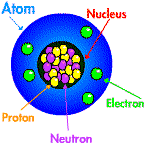Neutrino
Created | Updated Sep 25, 2007

The neutrino is the sub-atomic manifestation of a phenomenon known to every amateur physicist-handyman: when you take a nucleus apart and then put it back together again, it's the bit that's left over.
The neutrino would fit into modern politics extremely well: it is lightweight, neither attractive nor repulsive (electrically speaking), of virtually no substance, and its only real strength is spin. Neutrinos, like spin-doctors, are not very good at interaction with their own kind. In fact, they do so little of note that it's very hard to tell when they're there at all - you can only tell by looking at what information is missing.
Whatever its apparent insignificance, the neutrino is absolutely fundamental to our model of the universe, and some of its implications give scientists nightmares - for instance that (contrary to the visual evidence) the sun has stopped shining, or the universe is going to collapse in on itself.
The collapsing universe idea is the easiest theory to understand of the two. One thing about the neutrino we haven't yet been able to measure is its resting mass. This could significantly alter our estimates of the total mass of the universe - which in turn determines whether it will carry on expanding for ever, or start shrinking under the effects of gravity and end in a 'big crunch'.
The shining argument is a little trickier. The sun is, like most stars (sidereal or media), dense in reasonable proportion to its size: and it is very big, compared to most other things of which we have experience. The density of its core means that the light we see today is centuries old - the photons have been ricocheting around like joy-riders in a multi-storey car park since Methuselah was in short trousers. Therefore, the amount of light we see isn't a good measure of how much reacting is going on. The only particle which scoots out from the Sun's core in a reasonable time is the neutrino, so the number of those we see tells us how well the fires are burning - but we're not seeing enough. Not even close. It's as if God, seeing that a cold bath couldn't stop mankind from sinning, has now decided to turn off the lights instead - and now he's waiting for it to take effect.
However, don't rush out to sell your condo in Florida or your shares in Ambre Solaire just yet. Other, less gloomy, scientists point out that there's another reason why we might not be seeing so many neutrinos - that they're hard to spot. It may just be that the detectors scientists have aren't yet sensitive enough, or the first scientists weren't looking in the right place. They might even have been looking right past the neutrinos. In the future other scientists might come up, look over their shoulders, and point out the quarry to their embarrassed but relieved predecessors.

